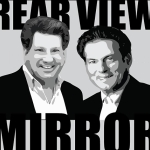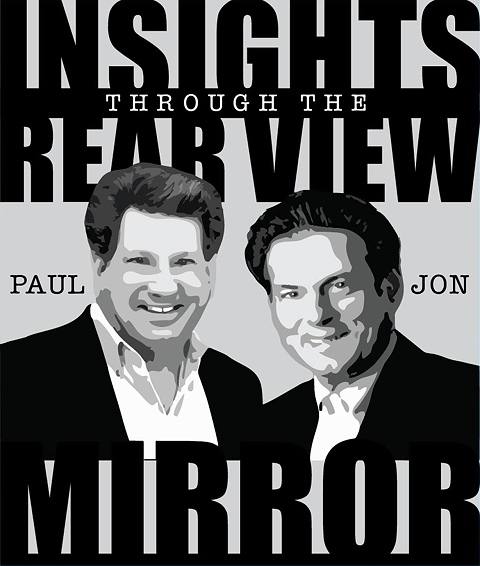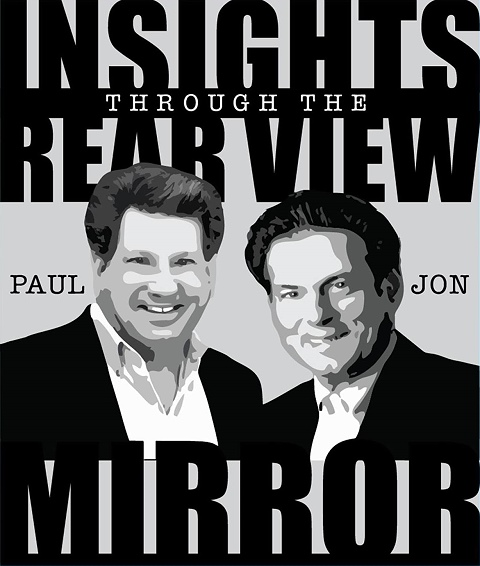Insights Through the Rearview Mirror, November 27, 2020
Insights Through the Rearview Mirror with Jon Kramer and Paul Kramer
Josh Kattef: Discusses the decisions that lead from Wall Street to Main Street
Insights Through the Rearview Mirror

“If I Knew Then What I Know Now – Insights Through the Rearview Mirror”
During the height of the Covid-19 Pandemic, marketing executives, and brothers, Jon and Paul Kramer were discussing the decisions each had made in their lives. The good, bad, big and small and how each of these decisions had informed and transformed their lives.
Out of these heartfelt conversations came the idea of helping others make more considered decision in their lives. And, while there are literally thousands of books on decision making, they started to discuss how to improve on these “how-to” text books to make the art of better decision making easier and more gratifying.
An ongoing theme was “If I knew then what I know now…”
“If I Knew Then What I Know Now – Insights Through the Rearview Mirror” is a journey through the decision-making process of interesting people. The question we will attempt to answer is there a decision-making framework that can lead to a more successful process? A way that will help you make better decisions.
In each episode, we will talk to interesting and intriguing guests about the decisions they have made in their lives, exploring the constructs they may have used and the learning that they have found in their very own “If I Knew Then What I Know Now” journey. Through these discussions, we will illuminate and amplify better ways to approach decisions and help you avoid deciding for the wrong reasons.
Josh Kattef: Using the Framework of Expected Value to Make Major Life Decisions
Even if you graduated with a degree in Mathematics and have a prestigious career as a Wall Street trader and poker player, life will present you choices that you cannot quantify or evaluate through logic alone.
We address:
How do I decide whether or not to make a career pivot?
How do I use the concept of expected value to make decisions in my life?
How can I avoid regret and be genuinely happy with the major life decisions I make?
John and Paul welcome Josh Kattef, who shares his 20-year journey as a professional in the world of finance to find out how a numbers guy who looks at life through a zero-sum game lens makes major decisions.
3 MAJOR POINTS DISCUSSED
-
Your family should serve as your compass when making major career and lifestyle decisions. A high-flying, fast-paced life in NYC characterized by regular nights out on top of a busy, prestigious career is probably best left to single men and women with their whole lives ahead of them. Money, while obviously a huge factor in the type of job or business you choose, is still just one of several factors you need to consider when deciding on a profession. Family should always be number one. If you have the resources and employability, relocating to the country or in a quieter neighborhood and taking on a less stressful role will do wonders for you and your family in the long run.
-
Expand your social life beyond your immediate work environment. This doesn’t just refer to the friends you hang out with after work. If you’re limiting your circle to those in your immediate professional environment, you’re missing out on amazing opportunities to add new, meaningful dimensions to your life. Don’t be afraid to reach out and join different groups, as you never know who you’ll meet and where those connections will lead you. Opportunities for personal and professional growth, as well as for philanthropy and outreach, are out there if you make an effort to look beyond the familiar.
-
Use the framework of expected value when making decisions. While it’s often difficult, if not impossible to quantify the potential value of your decisions, it is still important to gauge your choices by factoring in the elements that make up those choices. A simple example is deciding whether or not to bring an umbrella with you on a cloudy day by weighing the inconvenience of carrying an umbrella for several hours with the consequences of being caught without one on a day where there’s a 50/50 chance of rain. On the other hand, major business or career decisions amid COVID-19 require much more rationalization—and even taking into account some gut feelings—to calculate expected values.
OUTLINE OF THIS EPISODE
-
Why Josh decided to go into financial management upon graduating from MIT [03:44]
-
Josh’s role at Deutsche Bank [11:42]
-
Why Josh left a burgeoning career at Deutsche Bank [14:41]
-
Leaving New York City for the country [20:33]
-
Why Josh started his blog [26:52]
-
Expanding your network and opportunities beyond the company you work at [31:31]
-
What Josh would have done differently in his journey [36:56]
-
How to use the framework of expected value to make big decisions [40:17]
-
How Josh’s decision-making process has changed over the years [46:39]
ABOUT OUR GUEST
Since graduating from MIT in 1998 with a degree in Mathematics, Josh Kattef has led an interesting life as a trader, poker player, blogger, dog lover, and now dad. Straight out of school he joined JP Morgan, but soon moved on to Deutsche Bank, where he quickly became a director.
After a short 8-year tenure there, Josh chucked it all and moved to New Hampshire where he has been living with his wife, lots of dogs, and most recently a new daughter.
ABOUT OUR HOSTS
JOHN KRAMER:
Jon Kramer, Managing Director JMK Solutions www.jmk-solutions.com is a marketing services veteran with 35+ years of experience working with leading agencies, and major consumer packaged goods brands.
Most recently, Jon was the Enterprise Sales Marketing lead at WestRock, a $16B packaging and display company, responsible for interfacing with their largest clients. Earlier, he was CMO of the RockTenn Merchandising Division where he created a shopper-marketing team, and go-to-market strategies for the Henkel company. He was also responsible for providing the selling organization with insights into the evolving US retail environment.
Previously, Kramer served for 10 years as CEO of J. Brown, the Shopper Marketing agency of Grey Worldwide. He was responsible for creating the organizational positioning and strategy, and led all new-business efforts. During his tenure, J. Brown became the leading U.S. shopper marketing Agency, virtually defining the discipline.
PAUL KRAMER:
Paul Kramer’s distinguished marketing career is characterized by a long track record of building high performance communication organizations. His expertise is a unique blend of creativity, technical marketing analysis, and a keen business sense for strategic positioning. Paul’s earlier career included being the CEO of Catapult Marketing, President and COO of Hyper Marketing Inc and President and COO of D.L. Ryan Companies and has sat on Epsilon’s Strategic Management Team.
Paul is skilled in all areas of marketing. He is especially strong in strategic planning, national brand management, marketing communications, and business development. In addition, he has a solid management foundation with accomplishments in P&L management, intellectual property, forming and maintaining strategic alliances and building business.
Today, Paul is the General Partner of Riverside Consulting, a strategic consulting company working with senior leadership to help guide their business’ success.
RESOURCES
-
Visit our website: www.rearviewinsights.com










